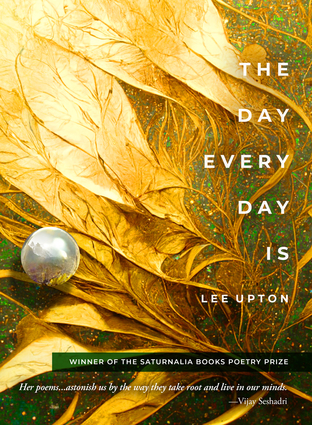Overview
Whether crisp and understated or capacious and kinetic, the poems in Lee Upton’s seventh collection are lyrically dexterous and reverberant. Shrewd, formally ambitious, excavating cultural myths and contradictions, these poems allow the ordinary and the supernatural to inhabit one another. The poems are often attentive to suffering: torture as it persists through centuries, the extinction of species, and the agonies of illness, grief, and the blasting of innocence are meditated upon. At the same time, in this book of mysteries, the cultivation of the redemptive energy of wit, in favor of the sensual and tender, performs as a means to resist violence.Reviews
"'The woods,' writes Lee Upton, 'walked out with us.' In The Day Every Day Is what is fixed is coming undone. God sheds like 'dry snow on grass,' myths blossom and wilt, ideas tremble at the edge of their own extinction. The world has had it, and Upton (with the genius and grace of a mystic) is here to arrange its splinters and shards into poems. What we learn from Upton is that if there is Nothing left, Nothing still remains and Nothing is radiant and wise and eerily resembles the day-est day." —Sabrina Orah Mark, author of Wild Milk and The Babies
"Lee Upton’s language is limpid and shimmering. Her voice is transparent and entirely her own. Her mind is clear and focused and profoundly informed. Her tone is casual, intimate, inviting. And all these elements conspire together in her work to create utterly convincing yet unexpected and unanticipated lyrical presentiments and precisions of awareness and insight. Her poems startle by what they show us of the world, and astonish us by the way they take root and live in our minds." —Vijay Seshadri, author of the Pulitzer prizewinning 3 Sections
"The voice meticulously crafted in these poems—a 'brisk voice rises / to the brim of language'—echoes by its restraint at times its embrace of privacy even as it reflects on long-sequestered details of domesticity and motherhood. At the same time, the poems in this book were authored in what the poet characterizes as 'my violent decades' and often succumb (against the poet’s approval) to especially gruesome scenes from classical mythology—in a dazzling poem about Marysas, for example, a musician flayed alive--a fate which figures vividly in a meditation on extinction. Indeed, beside the poems of domesticity, there are poems in this collection whose language begins to come undone in their unsparing account of physical torment—poems which genuinely terrorize and haunt the reader’s uncertain apprehension of other poems more ostensibly modest, such that one cannot be certain that all the poems in this book might not harbor, regardless of their demeanor, a truly disturbing and cathartic fascination with the intimacy of physical suffering. One is tempted to evoke the unruly phenomenon of 'late style,' if it were not the case that the language of these poems awakens long before the reader even begins to stir from her troubled sleep." —Daniel Tiffany, author most recently of Cry Baby MysticAuthor Biography
Lee Upton’s poetry has appeared widely, including in The New Yorker, Poetry, The Southern Review, and three editions of Best American Poetry. She is a fiction writer and literary critic as well as a poet. She has written six other collections of poetry, including Bottle the Bottles the Bottles the Bottles. She lives in Easton, Pennsylvania. www.leeupton.com

